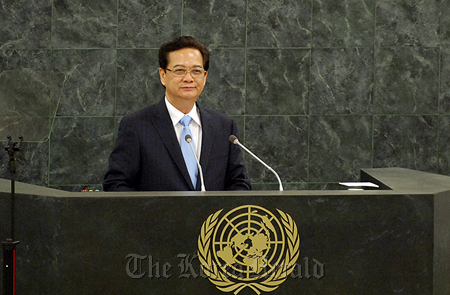Vietnam vies to become most attractive investment destination in S.E. Asia
By Korea HeraldPublished : Dec. 6, 2013 - 09:09

Vietnam’s National Assembly has approved draft amendments to the 1992 Constitution.
The changes are designed to be the driving force for Vietnam to develop an atmosphere of consensus, solidarity and institutional stability and to remain one of the most attractive investment destinations for international investors, including those from Korea.
Through the draft amendment to the 1992 Constitution, Vietnamese society will gradually move toward a true democracy and a fundamentally different economy that will emphasize the role of the private sector as a main and essential component. Amending the constitution is a new milestone achieved alongside economic accomplishments and the country’s incredible ability to overcome difficulties.
The Vietnamese socioeconomic situation is currently making strong progress in almost all sectors. The economy is on the verge of recovery and accomplished 11 of the 15 targets set by the National Assembly in 2013, including inflation control. Gross domestic product increased approximately 5.4 percent in 2013, up from 5.25 percent in 2012, and the inflation forecast for 2013 is about 7 percent.
This bright economic picture has been made possible thanks to the “creative” and “spinning” hands of Vietnamese Prime Minister Nguyen Tan Dung. Dung has proven himself to be one of the best-performing prime ministers in Asia by boosting the bleak economy after its state-owned enterprises incurred massive losses, and overcoming potential social unrest. This has enabled Vietnam to become the second most attractive destination in Southeast Asia after Indonesia, according to a recent survey of business prospects in ASEAN in 2014 by the American Chamber of Commerce in Singapore.
As the youngest prime minister of Vietnam since 1975, Dung had the courage to stand up and take personal responsibility for the “national debt” piled up by Vinashin. His determination to restructure Vinashin culminated in the bold removal of a “tumor” when he completely dismantled the company, replacing it with a completely new enterprise.
He also gave confidence to the business community when he paid regular attention to improving the business environment and attracting investment. Most recently, he has talked directly with and left a deep impression on many U.S. investors. After a meeting with the prime minister, many U.S. investors explored opportunities in Vietnam and have a desire to invest there.
Understanding better than anyone else about the role of “cash flow” from overseas development assistance and foreign direct investment in an economy like Vietnam’s, Dung unceasingly appealed to foreign investors. During his two terms of office, despite the global economic difficulties and uncertainties, FDI and ODA has kept flowing into Vietnam.
In particular, Korean investors always consider Vietnam a key partner in Southeast Asia. South Korea is currently the second-largest foreign investor in Vietnam, with approximately $25 billion (after Japan with $28 billion), but ranked first in terms of the number of projects (as of late 2012, the number of projects was 3,134), and Korea is Vietnam’s third-largest overseas market for investment after China and the United States.
About 2,500 South Korean companies have invested in Vietnam. South Korea is also the second-largest ODA provider for Vietnam (after Japan) with a total of $1,226 million for the period between 1995 and 2010 (including $300 million for 2010), another $411.8 million in 2011, and a commitment of $1.2 billion more for the period from 2012 to 2015. Vietnam is the largest recipient of Korean ODA among 20 strategic partners.
Korean investors chose Vietnam because it has political and social stability, low production costs, abundant human and natural resources, has established a network of stable supply for the operation of business, and is part of the ASEAN-Korea FTA. Specifically, Korean and other foreign investors are very confident in the economy-driving skills of the Vietnamese government, headed by Dung.
In 2014, the government of Vietnam announced that it would focus on providing complete and consistent direction for effective implementation of fiscal policy, monetary inflation control and macro-economic stability. It will also promote institutional reform as well as the administrative and business investment climate, creating a foundation for sustainable growth.
Vietnam’s goals for 2014 can be called “high goals” since Asian economies in particular and the global economy still show signs of potential difficulties and uncertainties.
-
Articles by Korea Herald









![[Hello India] Hyundai Motor vows to boost 'clean mobility' in India](http://res.heraldm.com/phpwas/restmb_idxmake.php?idx=644&simg=/content/image/2024/04/25/20240425050672_0.jpg&u=)









